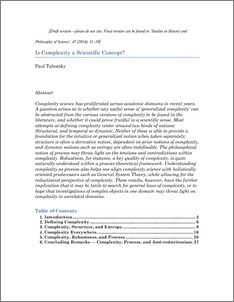Taborsky, Paul
(2014)
Is Complexity a Scientific Concept?
[Preprint]
![[img]](https://philsci-archive.pitt.edu/style/images/fileicons/application_pdf.png)  Preview |
|
PDF
Is_Complexity_a_Scientific_Concept_(Pre-Print).pdf
- Accepted Version
Download (306kB)
|
Abstract
Complexity science has proliferated across academic domains in recent years. A question arises as to whether any useful sense of ‘generalized complexity’ can be abstracted from the various versions of complexity to be found in the literature, and whether it could prove fruitful in a scientific sense. Most attempts at defining complexity center around two kinds of notions: Structural, and temporal or dynamic. Neither of these is able to provide a foundation for the intuitive or generalized notion when taken separately; structure is often a derivative notion, dependent on prior notions of complexity, and dynamic notions such as entropy are often indefinable. The philosophical notion of process may throw light on the tensions and contradictions within complexity. Robustness, for instance, a key quality of complexity, is quite naturally understood within a process-theoretical framework. Understanding complexity as process also helps one align complexity science with holistically oriented predecessors such as General System Theory, while allowing for the reductionist perspective of complexity. These results, however, have the further implication that it may be futile to search for general laws of complexity, or to hope that investigations of complex objects in one domain may throw light on complexity in unrelated domains.
Monthly Views for the past 3 years
Monthly Downloads for the past 3 years
Plum Analytics
Altmetric.com
Actions (login required)
 |
View Item |



